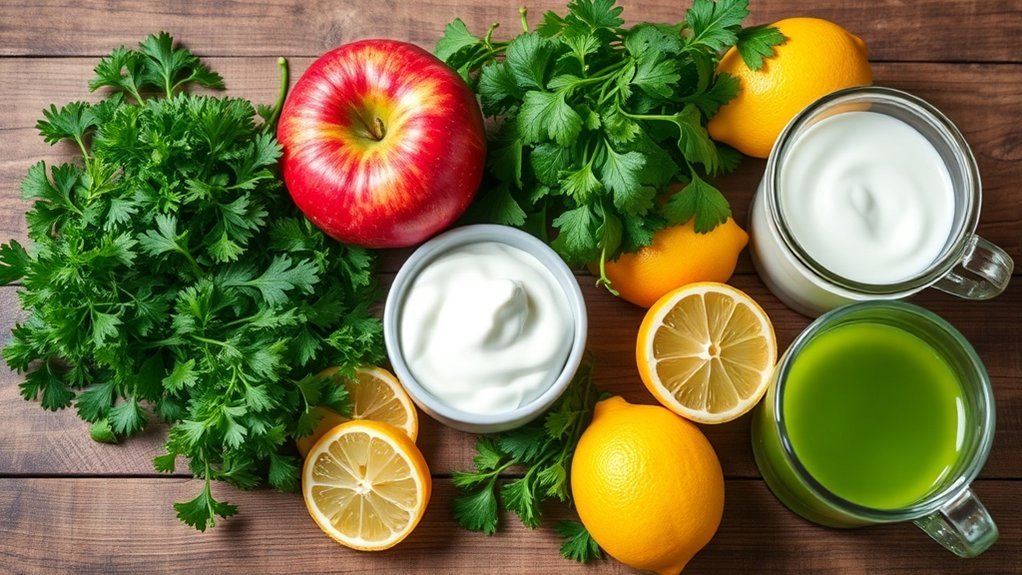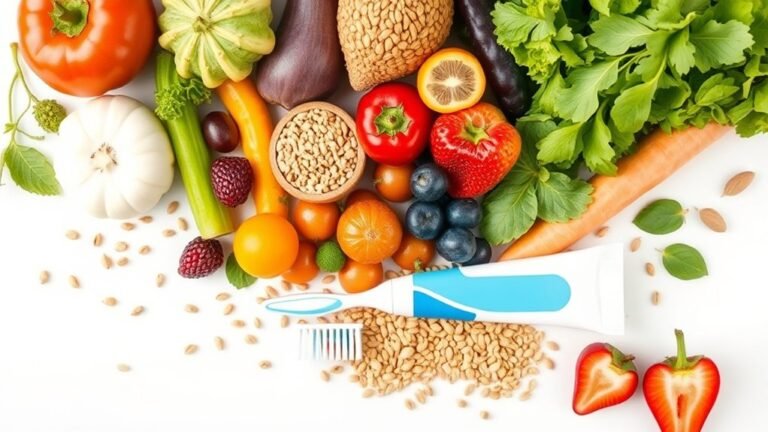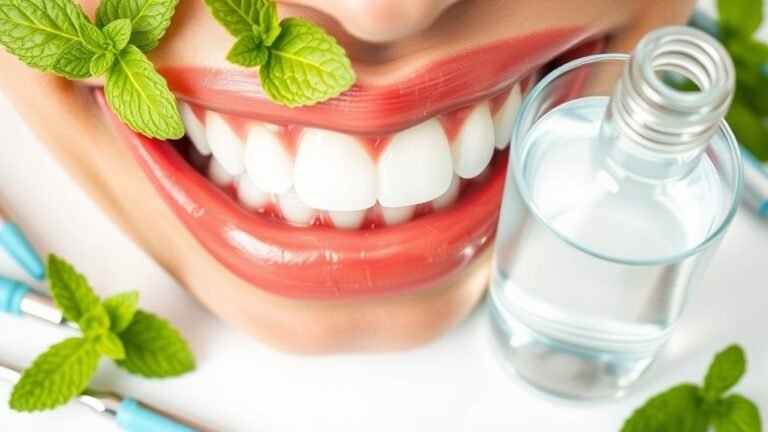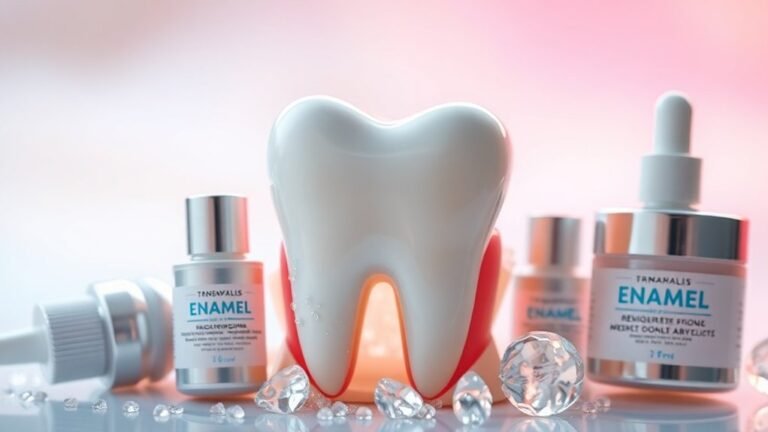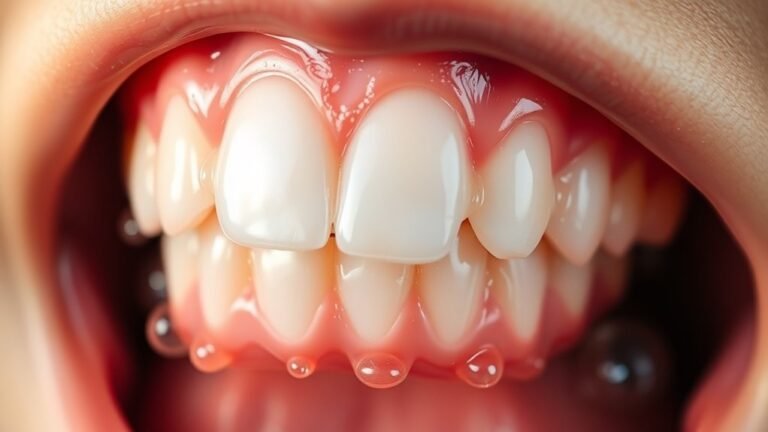What Foods and Drinks Reduce Oral Bacteria Causing Chronic Bad Breath
To combat chronic bad breath, incorporate foods and drinks like green tea, crunchy fruits, and yogurt into your diet. Green tea’s natural antibacterials help reduce harmful bacteria, while crunchy fruits act like nature’s toothbrush, enhancing saliva production. Yogurt provides probiotics that balance oral bacteria, and citrus fruits boost saliva, further neutralizing odors. Don’t forget to stay hydrated with water and include whole grains, nuts, and seeds for added benefits. There’s more you can do to improve your breath.
Key Takeaways
- Green tea contains natural antibacterials and polyphenols that combat bad breath and promote oral hygiene.
- Crunchy fruits and vegetables act as nature’s toothbrush, removing food particles and stimulating saliva production.
- Yogurt is rich in probiotics that balance the oral microbiome and lower harmful bacteria linked to bad breath.
- Citrus fruits boost saliva production and hydration, helping to neutralize odor-causing bacteria in the mouth.
- Nuts and seeds provide essential nutrients and help reduce harmful bacteria, supporting overall oral health.
Green Tea: A Natural Antibacterial Beverage
If you’re looking for a tasty way to combat bad breath, green tea might be your go-to beverage. Packed with natural antibacterials, green tea can help reduce the bacteria in your mouth that contribute to unpleasant odors. Studies show that the polyphenols in green tea, particularly catechins, are effective in inhibiting bacterial growth, promoting better oral hygiene. By sipping on green tea regularly, you not only freshen your breath but also support your overall dental health. It’s a simple addition to your routine that can make a significant difference. So, why not swap your usual drink for this antioxidant-rich option? You’ll enjoy its unique flavor while fighting off bad breath naturally.
Crunchy Fruits and Vegetables: Nature’s Toothbrush
While green tea offers a rejuvenating way to tackle bad breath, incorporating crunchy fruits and vegetables into your diet can enhance your oral care routine even further. These natural options, like apples, carrots, and celery, act as nature’s toothbrush, helping to remove food particles and plaque from your teeth. Their high water content also stimulates saliva production, which is essential for breath freshening. Plus, the fibrous texture of these crunchy foods promotes healthy gums. Eating a variety of crunchy fruits and vegetables not only supports your overall health but also reduces oral bacteria that contribute to bad breath. Make them a staple in your diet for a cleaner mouth and fresher breath!
Yogurt: Probiotics for Fresh Breath
Including yogurt in your diet can greatly improve your breath, as it’s packed with probiotics that support oral health. Probiotics help balance the oral microbiome, reducing harmful bacteria that contribute to bad breath. By regularly consuming yogurt, you can promote healthier dental health and fresher breath.
| Benefits of Yogurt | Impact on Oral Health |
|---|---|
| Rich in Probiotics | Balances oral microbiome |
| Lowers harmful bacteria | Reduces bad breath |
| Improves digestion | Enhances overall health |
| Supports immune function | Aids in preventing gum disease |
Incorporating yogurt into your meals or snacks can be a simple, effective way to enhance your breath freshness and maintain a healthy mouth.
Herbs and Spices: Flavorful Breath Fresheners
Herbs and spices not only enhance the flavor of your meals but can also serve as natural breath fresheners. When you incorporate herbs like parsley, mint, and basil into your diet, you’re tapping into powerful natural remedies for breath odor control. These herbs contain chlorophyll, which helps neutralize bad smells and freshen your breath. Similarly, spices such as cinnamon and cloves are rich in essential oils that have antibacterial properties, targeting the bacteria responsible for unpleasant breath. Chewing on these herbs and spices can stimulate saliva production, further aiding in cleansing your mouth. So, next time you’re looking to combat bad breath, consider adding these flavorful options to your meals or snacking on them for a quick breath boost.
Citrus Fruits: Boosting Saliva Production
Citrus fruits like oranges and lemons can greatly boost your saliva production, which plays an essential role in maintaining oral health. Increased saliva helps wash away food particles and bacteria, reducing the risk of bad breath. Incorporating a variety of these fruits into your diet not only freshens your breath but also provides vital vitamins and nutrients.
Saliva’s Role in Oral Health
While many factors contribute to oral health, one of the most important is saliva production. Saliva plays a significant role in washing away food particles and neutralizing acids, which helps to control oral bacteria. When saliva levels are low, you may experience an increase in harmful bacteria, leading to unpleasant breath odor. Citrus fruits, like oranges and lemons, can stimulate saliva production due to their acidity. This increased saliva flow not only helps combat bacteria but also aids in maintaining a balanced oral environment. By incorporating citrus fruits into your diet, you can enhance your saliva production, reduce oral bacteria, and ultimately improve your breath freshness. Staying hydrated is also essential for ideal saliva function.
Citrus Fruits’ Nutritional Benefits
When you think about boosting saliva production, citrus fruits come to mind for good reason. Rich in vitamin C, these fruits not only enhance your immune system but also stimulate saliva flow, which is essential for oral health. Increased saliva helps wash away food particles and bacteria, making citrus fruits an effective breath odor treatment.
| Citrus Fruit | Vitamin C Content (mg) | Saliva Boosting Effect |
|---|---|---|
| Lemon | 53 | High |
| Orange | 70 | Moderate |
| Grapefruit | 38 | Moderate |
| Lime | 29 | High |
| Tangerine | 26 | Moderate |
Incorporating citrus fruits into your diet can be a delicious way to maintain a fresh breath and healthy mouth.
Recommended Citrus Varieties
Enhancing your diet with specific citrus varieties can greatly boost saliva production, which plays an important role in combating bad breath. Incorporating foods like oranges, grapefruits, and lemons not only provides essential vitamins but also stimulates your salivary glands. These fruits’ natural acidity helps neutralize mouth bacteria, reducing halitosis. Citrus drinks, such as freshly squeezed orange juice or lemon-infused water, are excellent options too. They not only hydrate but also encourage saliva flow, effectively washing away food particles and bacteria. Remember, regular consumption of these citrus varieties can lead to fresher breath and improved oral health. So, include these delicious options in your meals and drinks to help combat halitosis effectively.
Water: The Essential Hydrating Solution
Staying hydrated is vital for maintaining fresh breath because water helps wash away food particles and bacteria in your mouth. When you’re well-hydrated, you’re less likely to experience dry mouth, which can contribute to bad breath. Additionally, the neutralizing effects of water can help reduce the growth of odor-causing bacteria, making it an essential part of your daily routine.
Importance of Hydration
Hydration plays an essential role in maintaining fresh breath, as water helps wash away food particles and bacteria in your mouth. Dehydration can lead to dry mouth, which reduces saliva production and negatively impacts gum health. Saliva is vital for neutralizing acids and keeping your mouth clean. While mouthwash can temporarily mask bad breath, it doesn’t replace the need for proper hydration. Drinking enough water guarantees your saliva remains plentiful, effectively combating bacteria that cause unpleasant odors. Aim for at least eight glasses of water daily to stay hydrated and support your oral health. By prioritizing hydration, you’re taking proactive steps to reduce bacteria and maintain fresh breath naturally. Remember, a well-hydrated mouth is key to a confident smile.
Water’s Bacterial Neutralization Effects
While you might not think of water as a powerful ally against bad breath, its ability to neutralize bacteria is vital for maintaining oral health. Water’s bacterial neutralization effects help wash away food particles and reduce the buildup of dental plaque, a primary contributor to bad breath. When you’re well-hydrated, your saliva production increases, which plays a significant role in keeping your gums healthy and your mouth clean. Saliva contains antimicrobial properties that combat harmful bacteria. By drinking enough water throughout the day, you support your body’s natural defense mechanisms, ensuring that your mouth stays fresh. So, make it a habit to sip water regularly—it’s a simple yet effective way to fend off chronic bad breath.
Whole Grains: Promoting Healthy Digestion
Incorporating whole grains into your diet can markedly enhance your digestive health, which is essential for combating bad breath. Whole grains help maintain a healthy gut, reducing the risk of bacterial infections that can contribute to unpleasant odors. When you consume these nutrient-rich foods, you’re promoting the growth of beneficial bacteria while keeping harmful ones at bay.
- Brown rice: A fiber-rich option that aids digestion.
- Quinoa: Packed with protein and essential nutrients.
- Oats: A hearty choice that supports gut health.
Nuts and Seeds: Nutrient-Rich Breath Helpers
Nuts and seeds are excellent additions to your diet, not only for their nutritional benefits but also for their ability to help combat bad breath. They provide essential nutrients that support overall oral health, aiding in dental cleaning and plaque control. Incorporating these crunchy snacks can reduce harmful bacteria in your mouth, improving your breath.
| Nuts | Benefits | Seeds |
|---|---|---|
| Almonds | High in Vitamin E | Chia Seeds |
| Walnuts | Omega-3 fatty acids | Flaxseeds |
| Pistachios | Antioxidants | Pumpkin Seeds |
Frequently Asked Questions
Can Certain Foods Worsen Bad Breath Despite Being Healthy?
Yes, certain healthy foods like garlic and onions can worsen bad breath due to their strong odors. Even though they’re nutritious, their compounds can linger in your mouth and contribute to unpleasant breath.
How Long Does It Take for Diet Changes to Improve Breath?
Like a garden blooming after rain, you’ll notice improvements in your breath within a few days to weeks. Consistent dietary changes pave the way for healthier oral flora, leading to fresher breath over time.
Are There Any Foods That Should Be Avoided for Fresh Breath?
Yes, you should avoid foods high in sugar and processed carbs, as they promote bacterial growth. Garlic and onions can also linger on your breath, so limiting these can help maintain fresher breath overall.
Can Bad Breath Be a Sign of a Serious Health Issue?
Yes, bad breath can signal underlying health issues, like gum disease or diabetes. Think of it as your body’s alarm system, urging you to seek professional advice for a proper diagnosis and treatment. Don’t ignore it.
Is It Necessary to Use Mouthwash With These Foods and Drinks?
You don’t necessarily need mouthwash with these foods and drinks. They can help reduce bacteria, but combining them with regular brushing and flossing is more effective for maintaining fresh breath and overall oral health.
Conclusion
Incorporating these foods and drinks into your diet can work wonders for your oral health, helping to combat chronic bad breath like a superhero fighting villains. Green tea, crunchy fruits, and probiotic-rich yogurt are just a few of the delicious options that can reduce harmful bacteria. Staying hydrated with water and munching on whole grains and nuts not only freshens your breath but also promotes overall wellness. So, grab these foods and enjoy fresher breath today!
